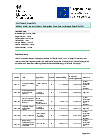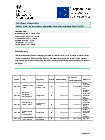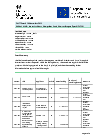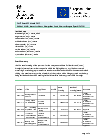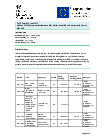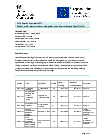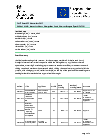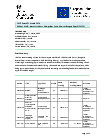Top tips for making a claim
-
You should make sure you sign and date your claim form. It should not be signed by agents or anyone who has helped you fill out the form. If you don’t sign the form it will be returned and payments will be delayed.
-
You should make sure the items you are claiming match the items listed on the offer letter. If they do not then you must contact the Marine Management Organisation (MMO) to discuss any changes.
-
You should make sure that any increases in costs being claimed or any other changes to your project have been approved by MMO in writing before you make your claim – this includes changes to suppliers. If the changes are not approved there is a risk that you will not receive your entire claim. Changes are things like additional unforeseen works, changes in costs due to increases in the cost of materials such as wood and steel.
-
You must supply original invoices or an email that you have received direct from the supplier with the invoice attached.
-
Provide a suitable audit trail to show how the invoice was paid either by cheque, bacs or faster payment, preferably in the form of a bank statement or online banking screen print. Cash payments are not acceptable as you cannot provide adequate evidence to support a cash payment.
-
Your payment will be delayed if you don’t send in all of the necessary information MMO needs to process your claim.
-
You must tell MMO as soon as possible if you will miss your claim date – this is in the claims schedule in your offer letter. If you need to change the claim schedule please submit a Notification of Change request via the e-system. The MMO will try and contact you if you go past your claim date but if we can’t get in touch with you, you could risk having your funding withdrawn.
-
If you have any queries about your claim contact MMO for advice.
Submit a claim for EMFF funds
You will need to submit a claim online in order to get your EMFF funds. Items purchased and claimed must be from the supplier stated in your offer letter and work must have started after you were sent confirmation that the MMO acknowledged your application. This date is in the offer letter. Any invoices dated prior to that date will be deemed ineligible and you will not be paid any grant money against those invoices.
You will only be able to claim once you have paid for all or some of the items outlined in your EMFF offer letter. You will need to provide evidence that you have done this when you submit your claim form. This evidence must be an invoice accompanied by proof that you have paid after the invoice was received, for example a bank statement.
Please make sure you fill in a SOP 7 form with your bank details so we can pay your funds to you. This form will be emailed to you with your offer letter. Once you have completed the form it needs to be emailed to emff.queries@marinemanagement.org.uk to enable your bank details to be set up on our payments system. If you have more than 1 project approved you only need to complete 1 SOP 7 form.
Claiming your grant money
The MMO will only pay you your grant money in arrears – you need to prove you’ve spent your money on the item or service by completing the online claim form in the e-system.
You will need to submit:
- dated invoices (example invoice) which show the amount of money you paid for each product or service you’re claiming
- proof of payment eg a bank statement
- a progress update on your project if it is required. See your offer letter for the progress report schedule
The MMO can decline to pay you part of the grant, or the whole grant, if we don’t think the information on your invoices is accurate, or the products or services you bought aren’t what was approved.
The conditions in your offer letter will explain about what you must do and the information you must send to get your grant paid.
Costs you can’t claim for
You must not claim EMFF grant money for the following:
- to pay interest on a debt
- to buy land or housing that’s worth more than 10% of your project’s total expenditure
- to pay your business’s operating costs, unless the MMO has told you otherwise
- if you have a loan on an item you have purchased you cannot claim for it until the loan is repaid
- any costs that you could recover in part or in total by making a claim on an insurance policy or by seeking compensation or damages
Reporting and inspections
Reporting your progress
You must give the MMO updates on your project as outlined in your offer letter which may be every 6 months, plus one performance report each year for the first 3 years. A reminder will be issued when these are due.
If you don’t carry out your project in accordance with the timetable in your offer letter, the MMO will ask you to explain the delay and any impact on your targets and benefits.
The MMO could then cancel your grant offer or change it depending on the reasons you give. Should this be the case a full explanation will be provided.
We may also decide to reclaim any funds you have already been paid.
The MMO can take criminal or civil action to reclaim any money we paid you if we find you gave false information in your application, or if you do any of the following:
- break the conditions in the grant offer letter
- use the money for a different purpose to what you said you’d use it for when you applied
- commit fraud
Inspections
You must let the MMO officials visit your vessel or other sites related to your project to check your progress and report it to the European Commission.
The following bodies can also inspect your project after you’ve been sent a grant offer letter:
- the National Audit Office
- the European Commission
- European Court Auditors
- any other agents deemed appropriate by the European Commission or MMO
They’ll usually give you at least 48 hours’ notice, but they don’t have to.
Reporting changes to your project
You usually need to apply to the MMO to change your project after you’ve signed and returned the offer letter, e.g. if you want to:
- change the make-up of your project matched funds
- increase or decrease the total cost of your entire project
- changes to the targets and benefits agreed in your offer letter
- use different contractors or suppliers to the ones agreed in your offer letter
- change the timetable of your project
- sell or dispose of any item of infrastructure purchased as part of your project
- stop any activity that’s part of your project
- change the location of the activity
You need to justify any changes by telling the MMO in your e-system account using a Notification of Change request.
If you change your project without telling the MMO, the MMO could cancel your grant award, change it or refuse to pay grant money for costs associated with the changes.
Any conditions in your offer letter apply for 5 years from the date your final claim is paid to you.
Retrospective amendments
Retrospective amendments cannot be considered. You must apply to the MMO to change your project before making changes including additional costs. If you modify your project without approval from the MMO the project or part of the project could be ineligible for payment.
Changing the cost of your project
If you increase the total cost of your project, the MMO will only pay you more grant money if we decide you couldn’t have predicted this increase when you were applying. You must contact us to discuss this as soon as you are aware of any changes in project costs.
If the total eligible costs of your project decrease, then so will the grant award.
Amendments where costs decrease
If you are making changes to your project that decreases your project costs and the targets and benefits will be delivered as planned you do not have to tell the MMO.
If you are making any changes to your project that decreases your project costs but the targets and benefits will not be delivered as planned you must inform the MMO as soon as possible so that options can be discussed.
Change of supplier
We understand that sometimes suppliers to your project have to change:
- if you need to change to a different supplier, if they supplied a quote on your original project application and the costs do not increase then you do not need to supply a new quote. If the costs have changed then you need to obtain a new quote from them and submit a change request form to MMO and get it approved before undertaking any changes
- if you need to change to a different supplier and they have not previously quoted even if the costs will remain the same you will need to obtain a new quote and submit a change request form to MMO and get it approved before undertaking any work.
- a rationale for all requested changes should be included in your Notification of change request.
Where a project is under the panel threshold and an amendment takes it over
Any project (whether approved by team assessment or panel) that has a cost increase of less than 10% of the total project cost can be assessed by team assessment. The MMO can choose to send any project decision or amendment to panel regardless of value if it is deemed necessary for reasons that can include but is not limited to complexity or risk to the EMFF fund.
Where a project was assessed by panel and the cost increase is greater than 10% of the total project cost the amendment must be assessed by panel at the next meeting or by written procedure if agreed. You will be informed by the MMO if this applies to you including the dates of the next panel.
If a number of amendments are received that collectively exceed 10% of the total project cost the MMO has the discretion to refer the requests to panel and to review the requests collectively. You will be informed if this decision is taken including the dates of the next panel.
Change to project manager within a company/project
If you have a change of project manager within your business or company you should inform the MMO in writing with the new contact details as soon as possible. If you don’t inform the MMO then it could result in your new project manager being unable to access or discuss the project.
Change of ownership
If you have had a project approved then you should not sell or dispose of any funded items of the project within 5 years of the date of the final grant payment. Consumables are exempt from this. (This is referred to as durability of operations).
If you sell or undertake any other action that changes the ownership of any funded item from the original applicant within the 5 years durability of operations the MMO must be informed in writing by you. This includes indirect changes e.g. where a premises or vessel on which the item is situated changes ownership.
It is your responsibility as the original applicant to inform the new owners of the funding obligations attached to the item. The new owners will be required to take on the terms and conditions of the grant for the time remaining up to 5 years of durability of operations. If the new owner of the item or items does not accept the terms and conditions of the funding then it is deemed that the item has not fulfilled its obligations to the scheme and therefore recovery proceedings may be started and funding recovered from you as the original applicant.
Declaring additional funding
If you apply for or receive a grant through another scheme, you must tell the:
- body that runs the other scheme that you’ve been accepted for EMFF funding
-
MMO that you’ve been accepted for another grant
The MMO can decide that you’re no longer eligible for EMFF funding if you get money from another scheme, based on the:
- source of the money – you’ll be more likely to be ineligible for EMFF funding if you’ve got funding from another European Commission scheme
- amount of money you got from the other scheme
- conditions of the other grant
If you’re deemed ineligible, the MMO can take action to get money back from you, or cancel any payments that were due.
Moving your vessel outside the EU
You must not transfer a fishing vessel outside the EU for at least 5 years after spending EMFF grant money on it – if you do this you must give back part of the EMFF money you received.
The exact amount you have to pay back depends on when you transferred the vessel.
Records you must keep
If your application is successful, you must keep all documents related to your project for at least 5 years from the date of your last EMFF claim, including:
- licences
- consents
- quotes
- invoices
- receipts or other documents which record your spending
- all accounting documents related to your application
- claim forms
You must give the MMO or the European Commission any information or documents that they ask for at any stage.
The MMO may give your name and address to an independent person they’ve hired to evaluate your project.
You should also keep your project documentation under a separate accounting system or accounting code to ensure it is easily differentiated from your businesses other accounts and transactions.
Transparency Initiative
The MMO make public all beneficiaries of the grant aid from EMFF.
MS Excel Spreadsheet, 151KB
This file may not be suitable for users of assistive technology.
Request an accessible format.
If you use assistive technology (such as a screen reader) and need a
version of this document in a more accessible format, please email communications@marinemanagement.org.uk.
Please tell us what format you need. It will help us if you say what assistive technology you use.
EMFF panel decisions
PDF, 103KB, 2 pages
This file may not be suitable for users of assistive technology.
Request an accessible format.
If you use assistive technology (such as a screen reader) and need a
version of this document in a more accessible format, please email communications@marinemanagement.org.uk.
Please tell us what format you need. It will help us if you say what assistive technology you use.
PDF, 100KB, 2 pages
This file may not be suitable for users of assistive technology.
Request an accessible format.
If you use assistive technology (such as a screen reader) and need a
version of this document in a more accessible format, please email communications@marinemanagement.org.uk.
Please tell us what format you need. It will help us if you say what assistive technology you use.
PDF, 106KB, 2 pages
This file may not be suitable for users of assistive technology.
Request an accessible format.
If you use assistive technology (such as a screen reader) and need a
version of this document in a more accessible format, please email communications@marinemanagement.org.uk.
Please tell us what format you need. It will help us if you say what assistive technology you use.
PDF, 106KB, 2 pages
This file may not be suitable for users of assistive technology.
Request an accessible format.
If you use assistive technology (such as a screen reader) and need a
version of this document in a more accessible format, please email communications@marinemanagement.org.uk.
Please tell us what format you need. It will help us if you say what assistive technology you use.
PDF, 106KB, 2 pages
This file may not be suitable for users of assistive technology.
Request an accessible format.
If you use assistive technology (such as a screen reader) and need a
version of this document in a more accessible format, please email communications@marinemanagement.org.uk.
Please tell us what format you need. It will help us if you say what assistive technology you use.
PDF, 106KB, 2 pages
This file may not be suitable for users of assistive technology.
Request an accessible format.
If you use assistive technology (such as a screen reader) and need a
version of this document in a more accessible format, please email communications@marinemanagement.org.uk.
Please tell us what format you need. It will help us if you say what assistive technology you use.
PDF, 107KB, 2 pages
This file may not be suitable for users of assistive technology.
Request an accessible format.
If you use assistive technology (such as a screen reader) and need a
version of this document in a more accessible format, please email communications@marinemanagement.org.uk.
Please tell us what format you need. It will help us if you say what assistive technology you use.
PDF, 109KB, 3 pages
This file may not be suitable for users of assistive technology.
Request an accessible format.
If you use assistive technology (such as a screen reader) and need a
version of this document in a more accessible format, please email communications@marinemanagement.org.uk.
Please tell us what format you need. It will help us if you say what assistive technology you use.
European Grants Team
Marine Management Organisation
West Wing
Lancaster House
Hampshire Court
Newcastle Business Park
Newcastle Upon Tyne
NE4 7YH
Telephone: 0208 026 5539
Fax: 0191 376 2681
Email: emff.queries@marinemanagement.org.uk

